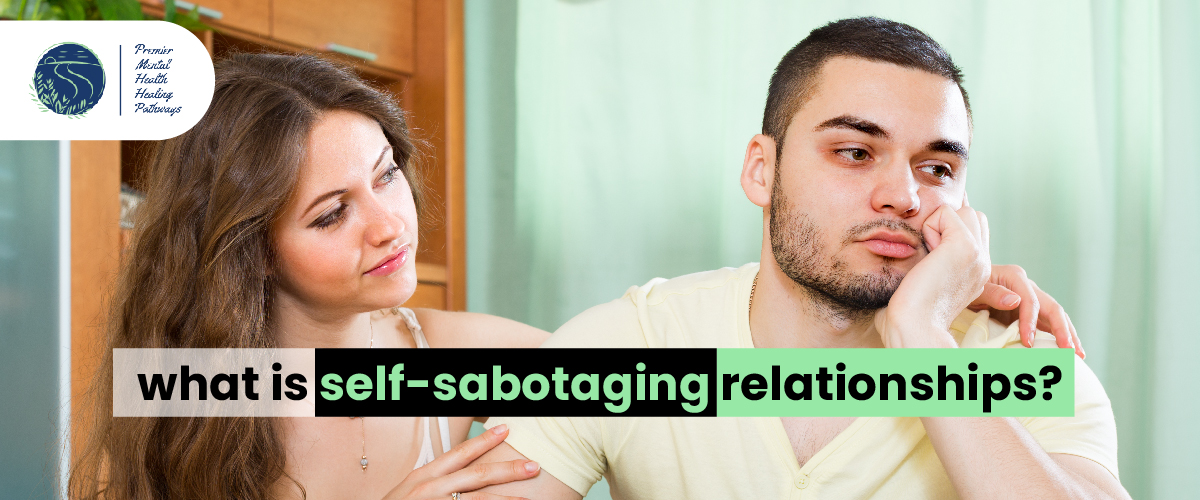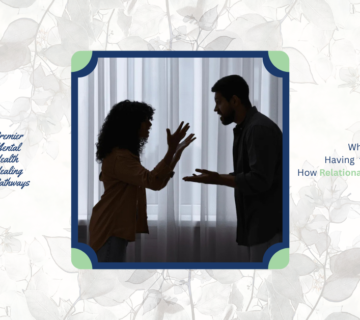Self-Sabotaging Relationships
Intimacy and social connections are things that all humans want. However, intimacy can cause fear and trauma in some people, which can lead to self-sabotaging actions that hurt or even end relationships.
These patterns can lead to unhealthy relationships, loneliness, and social isolation if they are not addressed and fixed.
Self-sabotaging relationships can be hard to break, but you can learn to see and stop doing these things with the help of therapy, whether you do it in person or online.
Find out how to spot and stop self-sabotage in relationships by reading on.
Are you and your partner struggling with relationship issues??
Do visit Premier Mental Health Healing Pathways one must go on a journey of self-discovery, healing, and growth to understand how relationships work.
What Is Self-Sabotaging Relationships?

In self sabotaging relationships, one or both partners do things that hurt the success and happiness of the relationship.
These actions may or may not be intentional they usually come from deep-seated fears, insecurities, or traumatic events in the past.
Self-sabotaging actions increase distance and conflict instead of encouraging growth and closeness.
Reasons of Self-Sabotaging Relationships
Gaining control over self-sabotaging behaviour requires figuring out why it happens in the first place. These are some common reasons why people self-sabotage:
- Past Trauma
Deep-seated fears that affect current relationships can come from being betrayed, abandoned, or abused in the past. People may choose to hurt their relationships in order to avoid pain in the future.
- Low Self-Esteem
When you do not think you deserve love and attention, you might act in ways that push other people away. People who have low self-esteem may act in ways that make them feel like they do not deserve a happy, healthy relationship.
- Fear of Vulnerability
It can be scary to be open and vulnerable in a relationship. Some people might put up barriers to intimacy so they do not have to risk getting hurt.
- Fear of Change
Relationships need to change and grow. Some people may find this intimidating, leading them to sabotage the relationship in order to avoid the discomfort of change.
Signs of Self-Sabotaging Relationships
- Fear of Intimacy
Some people are afraid to get too close to their partner because they do not want to be hurt or turned down. Because of this fear, they might push their partner away or avoid making deeper emotional connections.
- Negative Self-Talk
People may feel like they are not good enough if they constantly question their worth or how attractive they are. This bad feeling can show up as jealousy, possessiveness, or needing to be reassured all the time by the partner.
- Overanalyzing and Overreacting
Thinking too much about every part of the relationship and assuming negative conclusions too quickly can add stress that is not needed. Misinterpreting a partner’s actions or words often leads to conflicts that could have been avoided.
- Perfectionism
Setting unrealistic goals for the relationship or the partner means expecting them to be perfect. This can lead to disappointment and anger when these unrealistic goals are not met.
- Avoiding Conflict
When you do not deal with problems and try to avoid conflict, anger can build up over time. Unresolved problems often get worse over time and blow up, doing a lot of damage to the relationship.
- Controlling Behavior
Limiting your partner’s freedom and independence by trying to manage all aspects of the relationship or their daily life can be toxic. This behavior often makes people feel suffocated and angry.
- Sabotaging Success
People may put down their partner’s successes or accomplishments out of jealousy or insecurity, which can make the relationship less supportive and encouraging.
Examples of Self-Sabotage in Relationships
Self-sabotage in relationships can take many forms. For example, someone might always fight over small things, avoid closeness, or not trust their partner for no reason.
They might also say bad things to themselves because they think they are not good enough to be loved, which hurts the relationship.
People often act in ways that are not realistic, like pushing their partner away when things get too close or overthinking everything they do.
In addition, they might ruin good times by making drama out of nothing or not talking about their needs and feelings.
These actions, often caused by fear and insecurity, can stop people from building healthy, long-lasting relationships.
Overcoming Self-Sabotaging Behaviors
To break the cycle of self-sabotage, you need to be aware of it, work at it, and sometimes get help from a professional. Here are some steps to help overcome these destructive behaviors:
- Self-Reflection
Identify and acknowledge the self-sabotaging behaviors and their underlying causes. Journaling, meditation, or talking with a trusted friend can help in this process.
- Open Communication
Share your fears and insecurities with your partner. Open, honest communication can foster understanding and support.
- Therapy
Getting help from a therapist or counselor can give you useful information and tools to help you control and stop self-destructive habits.
- Building Self-Esteem
Engage in activities that boost your self-worth and confidence. Surround yourself with positive influences and practice self-compassion.
- Setting Realistic Expectations
Accept that no relationship is perfect. Pay attention to the good things about your relationship and accept the flaws.
- Conflict Resolution
Learn how to deal with and solve problems in a healthy way. Setting limits, practicing active listening, and finding middle ground could all help with this.
Conclusion
Self-sabotaging behaviors can severely impact relationships, leading to unnecessary conflict, emotional distance, and eventual breakdowns.
To keep your relationships healthy and happy, you need to be aware of and deal with these behaviors.
Self-harm is hard to see and stop, but therapy can help, whether it is in person or online.
To make their relationships with their partners stronger and more stable, people can figure out what fears and insecurities make them act in these ways.
Getting help from mental health professionals like those at Premier Mental Health Healing Pathways can help you and your partner heal and learn more about yourself. This will make your relationship better and more affectionate.
FAQs
How to deal with a self-sabotaging partner?
It is important to remember that it is not your fault if your partner tries to hurt your relationship. They should not get away with what they did, but do not take it personally either.
Try to reinforce good behavior and praise them when they do something right. Lastly, tell them they should get help from a professional.
How does past trauma influence self-sabotaging behavior?
If someone was betrayed, abandoned, or abused in the past, it can leave them with deep-seated fears that hurt their relationships now. People may hurt relationships in order to avoid the pain they went through in the past.
Can low self-esteem cause self-sabotaging behavior in relationships?
Yes, people with low self-esteem may hurt themselves by pushing others away or doing harmful things because they do not think they deserve love and attention.





No comment